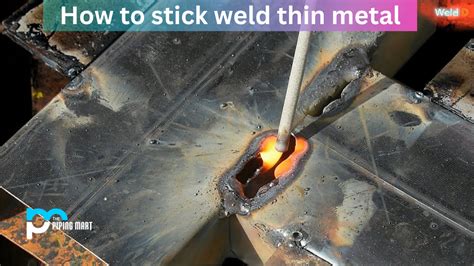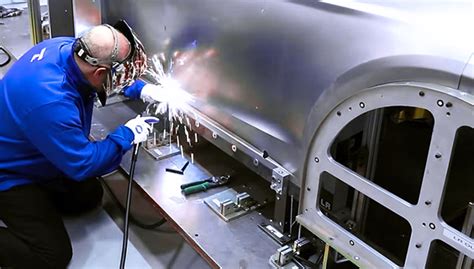sheet metal welding process Each welding process requires specific precautions and equipment setup for a successful sheet metal weld. So, let’s discuss the preparation needed for each arc welding process before proceeding to the common problems with thin gauge welds. See more Check out our metal boxes with handles selection for the very best in unique or custom, handmade pieces from our boxes & bins shops.
0 · welding thin metal with stick
1 · welding sheet metal with mig
2 · welding 24 gauge sheet metal
3 · welding 22 gauge sheet metal
4 · welding 16 gauge sheet metal
5 · welder settings for sheet metal
6 · mig welding sheet metal basics
7 · best welder for sheet metal
$350.00
Each welding process requires specific precautions and equipment setup for a successful sheet metal weld. So, let’s discuss the preparation needed for each arc welding process before proceeding to the common problems with thin gauge welds. See more
Now that we’ve covered the essential considerations for different arc welding processes, let’s discuss how to prevent and fix common . See moreWelding thin metal is challenging. There is no denying that. But, if you practice and use the tips we shared in this article, you’ll get the best chance for success. After you inevitably burn through some scrap sheets of metal and warp others, you’ll gain more experience and learn . See more Learn about six methods of sheet metal welding, including MIG, TIG, stick, plasma, laser, and gas welding. Find out their advantages, applications, and tips for different surface types. To weld sheet metal with solid wires, use electrode positive (EP, or reverse polarity). Don’t attempt to weld thin materials like sheet metal with flux-cored wires, which put .
Here, we’ll explore the sheet metal welding methods we use in our shop and explain what to expect from each one. Table of Contents. 1 Spot Welding. 1.1 Considerations for spot welding. 2 Tack Welding. 2.1 .
welding thin metal with stick
welding sheet metal with mig
Sheet metal welding methods. There are several different methods and approaches to sheet metal welding, and each method has its own uses in different circumstances. Our first goal is to provide information about different . The welding process begins by heating the metal piece’s surface until it reaches the melting point. Afterward, the melted metal joins together as it cools by forming a strong joint. Another material known as fillers was also . Sheet metal welding is a crucial fabrication process because it is one of the simplest ways to join cut-out pieces of metal sheets to create the desired shape. In Sheet metal welding, the mating surfaces are subjected to . Sheet metal welding is a joining technique that fuses two or more pieces of thin sheet metal using pressure, heat, or both. This allows manufacturers to fabricate the desired .
What Is Sheet Metal Welding? The joining of two or several thin sheets of metals by means of heat and/or pressure is sheet metal welding. In this way, the required metal . Sheet Metal Forming Process: A Complete Guide. Common Sheet Metal Welding Types: Sheet metal welding has various processes, each suitable for specific uses. Let’s look at key methods of metal Welding. MIG Welding .The sheet metal fabrication process is an intricate journey from raw metal to a finished product. It involves various steps, ensuring the final product meets specific standards and functions. It involves various steps, ensuring the final product meets specific standards and functions.

MIG (Metal Inert Gas) welding is a welding process whereby a consumable wire electrode is continuously fed through a welding gun and an electric arc is formed between the wire and the metal workpiece. This high temperature arc causes the metal to melt and fuse. Around this electrode, a gas is applied to shield the weld area and remove any air, helping the weld to fuse.Sheet Metal Welding Guide • Third Edition iii FOREWORD Sheet metal contractors know that joining metal is a very labor−intense part of their business. Many hours are spent welding the various parts together that make up the total sheet metal system. Managing the welding operation of the contractors business is a vital part of the total .
welding 24 gauge sheet metal
Sheet metal welding is a crucial fabrication process because it is one of the simplest ways to join cut-out pieces of metal sheets to create the desired shape. . Another name for MIG welding is Gas Metal Arc Welding (GMAW). The welding process in which the consumable solid wire electrode creates the melt pool in the joining position. The . At Approved Sheet Metal, we find that welding sheet metal is one of the most misunderstood processes in precision sheet metal fabrication. In an effort to demystify welding and help our customers choose the optimal welding method for a part, we do our best to clearly outline the benefits and limitations of different custom welding techniques.
Welding plays a critical role in the sheet metal process as it allows for the secure joining of separate metal pieces. During welding, high heat is used to melt the parts together, often with the addition of a filler material to form a secure joint.The sheet metal welding process is essential for creating strong, reliable products. It demands attention to detail of material properties to achieve seamless results. In this guide, we’ll explore the crucial steps in effective sheet metal welding. We’ll also cover the best practices that fabricators apply for high-quality welds. Sheet Metal Welding Code, also provides for maintenance of the document and presents up to date practices in sheet metal welding and joining processes since the 2000 revision. The 6. th . edition D9.1M/D9.1:2012, Sheet Metal Welding Code, provides for maintenance of the document and incorpo- During the welding process the metal will get hot and the gap a welder leaves will compensate for the expansion that occurs. You can test fir the panel first with an even 1/16″ gap around the patch. The weld puddle will fill in the gap that you have left. . Sheet metal welding can be easy if you apply the necessary technique. A welder does .
electricity saving box review
The process of sheet metal welding involves combining two or more metal pieces using heat. This technique provides structural integrity, strength, and durability to our components. They are perfect for industries requiring precision and reliability. Welding is a combination of art and science. It ensures that every piece is not only functional .The sheet metal welding process involves joining thin sheets of metal through heat and pressure, creating a strong, durable bond. It typically includes the following stages: Preparation: Cleaning the metal surfaces to remove dirt, rust, or grease, and aligning the metal sheets properly.3 Sheet metal welding process. The welding of sheet metal parts often uses oxygen arc welding, resistance spot welding, carbon dioxide gas shielded welding and manual arc welding. The selection of the specific welding process and the formulation of the plan need to be considered in combination with the material, shape and use of the sheet metal .There are many different methods for sheet metal welding, but the 3 we are going to discuss are MIG, TIG, & laser welding. Read the items to consider for each here. . Process. MIG Welding, also known as Gas Metal Arc Welding (GMAW), is an arc welding process that uses a continuous solid wire electrode. It is fed through a welding gun where .
Sheet metal welding is a process that involves welding thin metal sheets together under high temperatures. The welding process involves heating the workpieces to their melting point or beyond till they fuse together, forming a solid continuous bond. The most widely used arc welding method for thin sheet are gas metal arc welding and gas tungsten arc welding (GMAW and GTAW), more popularly known metal inert gas (MIG) and tungsten inert gas . Sheet metal welding is the process of joining thin metal sheets, typically less than 6mm thick, using various welding techniques. It is a crucial process in manufacturing, allowing for the creation of strong, durable structures that can withstand significant stress and strain.
Sheet metal welding is a process that involves welding thin metal sheets together under high temperatures. The welding process involves heating the workpieces to their melting point or beyond till they fuse together, forming a solid continuous bond. There are a variety of sheet metal welding techniques. However, the methods fall into two general categories namely, fusion welding and solid-state welding. Choice of the right sheet metal welding process relies on the sheet metal material type and conditions in which you will use the fabricated part.
Welding sheet metal can be a nightmare with all of the warping and blow through caused by excessive heat. In this video I will be showing you 4 different te.IV. The Welding Process A. Setting Up the Wire Feed Welder. Adjust the welder settings according to the thickness of the sheet metal and the type of wire being used. This typically involves setting the voltage and wire speed, which will vary based on the specific project and equipment. B. Techniques for Welding Sheet MetalThe characteristics of the sheet metal welding process. 1. It saves metal materials and owns light structure 2. It uses small pieces form to make big ones and turns big things into small ones to manufacture heavy and complex machine parts, simplify casting, forging, and cutting processes, then get the best economic benefits.Welding sheet metal isn’t just a process; it’s an art form that demands skill, patience, and a keen understanding of the materials. Whether you’re a procurement officer like our friend Jack or a curious observer, understanding this process is fundamental to appreciating the value of your sourcing products. Remember the journey from a .

Sheet metal welding is a fabrication process that involves joining two or more pieces of metal by applying heat, pressure, or both to form a strong, permanent bond. Metals present a unique challenge, unlike other materials, due to their high melting points and conductivity. Sheet metal, in particular, requires precise control over the welding .Welding is a process that joins metal pieces together, and it is the most common method used for this purpose. Among the many types of welding, sheet metal welding is significant in fabricating metal structures, piping, tanks, and much more. Understanding different welding processes and acquiring adequate knowledge can help with projects.What is Metal Sheet Welding? Metal sheet welding refers to the process of joining two or more metal sheets into a single unit through heating or pressure, creating atomic bonds between them. This process is widely used in CNC machining part manufacturing, especially in industries like automotive, aerospace, construction, and electronics. 6 .
welding 22 gauge sheet metal
3. Adjust Your Torch Angle. Changing the torch angle when MIG welding goes a long way to preventing burn-throughs. Make sure you adjust the angle to shorten the distance between the tip and the metal, no matter the welding position you work in.This will make the arc more stable, giving you more control over the weld and lessening the chance of burn-through. The selection of the appropriate metal welding process is crucial for the success of a manufacturing project. Each welding process offers unique advantages and disadvantages, making it necessary to choose the right method depending on the specific requirements of the project. . Custom cut sheet metal shapes flat metal sheets into customized .
Get the best deals for vintage industrial metal cabinet at eBay.com. We have a great online selection at the lowest prices with Fast & Free shipping on many items!
sheet metal welding process|welding thin metal with stick